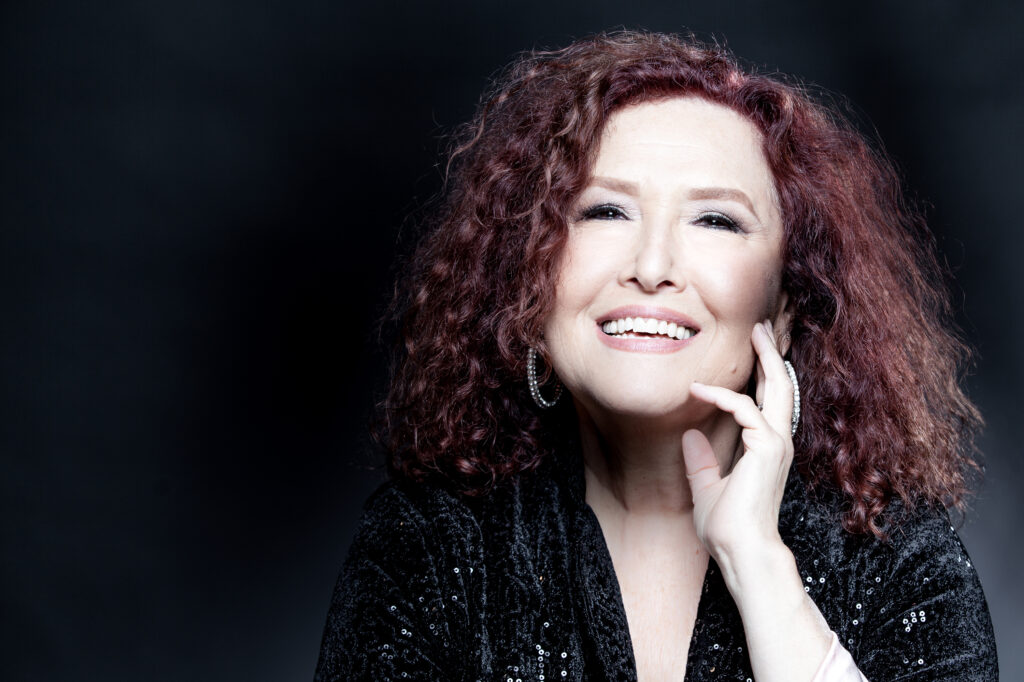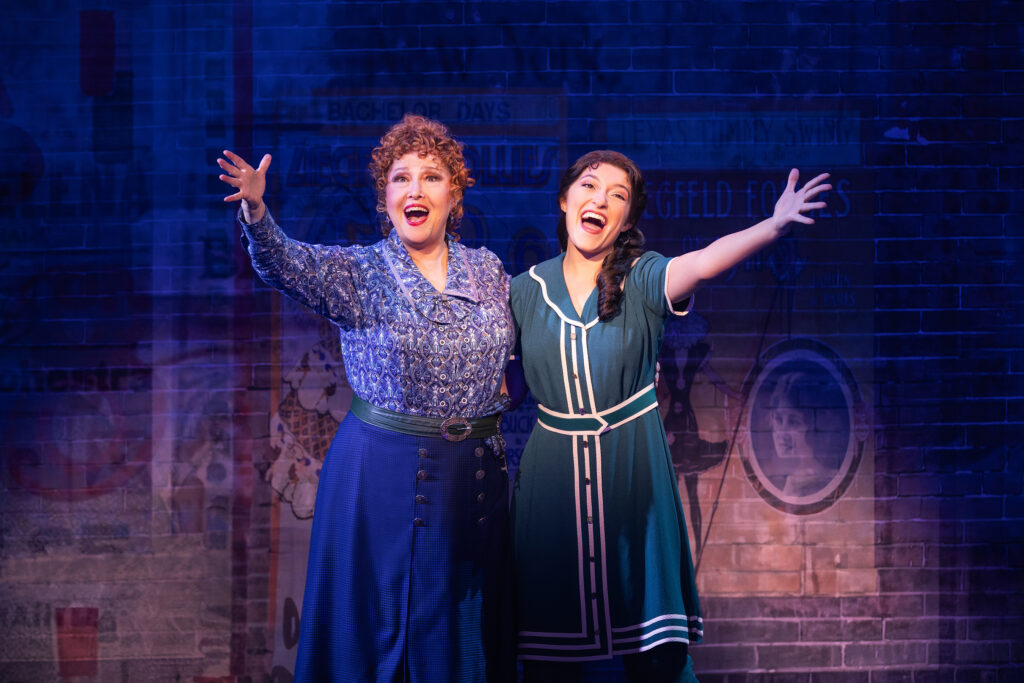Melissa Manchester: 50 Years of Making Music

Years before Grammy Award-winning singer-songwriter Melissa Manchester took the stage in the current national tour of the Broadway revival of “Funny Girl” – coming to the Ahmanson Theatre on April 2 and the Segerstrom Center in Costa Mesa on May 28 – she was mesmerized by the iconic original musical theater production starring Barbra Streisand in 1964.
Manchester, who plays Ziegfeld star Fanny Brice’s Jewish mother, was just 12 when Streisand made her debut as the young Fanny – inspired by the real-life Jewish actress and comedienne Fanny Brice. In the show, she’s an aspiring performer who becomes a Ziegfeld star while romancing a gambler early in the last century.
“Barbra Streisand was a new star, and she was a new kind of star,” Manchester, who lives in Los Angeles, said in a recent Zoom interview. “She embodied the paradigm shift as to what a star could be.
Nobody had ever looked like her; nobody had ever sounded like her. And she was brilliantly talented, as funny as could be.”
“I think the whole point of empowering oneself is to find what society snubs you on and saying, ‘I’ll show you, and I’ll do it better. And I will create beauty in a new light.”
Streisand proved inspirational for Manchester, who went on to record 25 of her own albums, including hits such as “Don’t Cry Out Loud,” “Come in from the Rain” and the Grammy-winning “You Should Hear How She Talks About You.”
The arts were crucial to her from a young age. “I was raised in an extremely musical home,” Manchester said. “My father was a bassoonist for 30 years with the Metropolitan Opera; my mother sang beautifully and was also a pioneer in the fashion industry as a designer and manufacturer.”
In Manhattan, her family lived next door to B’nai Jeshurun synagogue at 88th Street and Broadway: “During the high holidays, when it was warm out, nobody had air conditioning,” she said. “So, we had our windows open, they had their windows open, and we would listen to services in bed.”
Melissa also listened to Ella Fitzgerald and took piano lessons, among other endeavors. “It was all just part of the musical landscape of my childhood,” she said.
Manchester’s bubbie, Jennie Polsky, who hailed from a shtetl in Ukraine, experienced terrifying pogroms around 1912 when she was just 14. “Either she or her mother saw a relative butchered, so an escape plan was hatched that night for Jennie and her cousin,” Manchester said.
The girls fled through the forests, with some silver sewn into the hem of Jennie’s coat, and eventually arrived in the United States.
In the U.S., Jennie’s husband, Max Polsky, helped found a small Orthodox synagogue near their home in the Bronx.
Manchester’s father was “a virulent atheist,” though her mother lit Shabbat candles every Friday night, she said. Thus, Melissa’s Jewish childhood had “an interesting kind of push-pull,” added the musician, who ultimately developed her own approach to Judaism and spirituality. At 50, she had a bat mitzvah at Stephen S. Wise Temple.
By the age of 15, Manchester, who attended New York’s High School for the Performing Arts, was already singing jingles professionally. In the early 1970s, she was playing at coffee houses in Greenwich Village; Bette Midler and her musical colleague, Barry Manilow, chanced to catch her show. Midler soon hired Manchester to perform as one of her backup singers, the Harlettes. Just a few months later, Manchester signed a solo recording contract of her own. Manilow, she said, is still what she calls “a 3 a.m. friend,” meaning that they can phone each other to talk any time. In 1973, Manchester released her debut album, “Home to Myself.” Over the years, she also performed in her share of musical theater productions, including replacing Bernadette Peters in Andrew Lloyd Webber’s “Song and Dance” on a national tour in 1987.
But when “Funny Girl” composer Jule Styne approached her to star as Fanny in a revival of the show in the early 1980s, Manchester turned him down. “He was as sweet as could be, but I was very busy in the early 1980s,” she said. “And my feeling was that 1982 was too close to 1964, when Streisand had her incredible triumph with the show. Her shadow was lingering, and I didn’t want to be compared.”
Yet by last year, when she heard that “Funny Girl” was heading back to Broadway, with a book revised by Harvey Fierstein, she immediately contacted her manager to arrange for an audition. “It was an interesting experience because I don’t audition that often,” Manchester said. “I was sent some scenes to learn and I went in there with a bun on top of my head, and all brown clothes with flat white shoes.”
When Manchester didn’t land the Broadway role, she “just let it go,” she said. “And then my manager got an email asking if I’d be interested in doing the national tour, which would be a year long.” The artist was initially hesitant because she had hoped to spend time with her new granddaughter, Layla, now 10 months old. But her children convinced her that playing Rose was not an opportunity to be missed.

Then there was Manchester’s connection to her character. Like her own grandmother, Rose is, in her way a survivor: When the singer spoke to some of Rose’s old neighbors to prepare for the role, they described her ex-husband as a bum. “She was also a successful saloon keeper which in that day was so wildly out of expectations for women,” Manchester said. “And, context being everything, she was probably the only owner of a business for miles around as a woman. She had to deal with men all the time who were trying to do a number on her.”
Meanwhile, Rose worries about her talented daughter, Fanny, who is not only dating a gambler but also manages to stay confident even as people in show business and beyond deride her appearance.
Manchester told JLiving, “The point you’ve brought up about her look…is in the title of the show. She’s seen as a ‘funny’ girl. She looks funny, but she sees herself as beautiful and as a star. She’s going to use her funny-lookingness as an asset. I think the whole point of empowering oneself is to find what society snubs you on and saying, ‘I’ll show you, and I’ll do it better. And I will create beauty in a new light.’”
Asked whether she herself has ever encountered such scrutiny, Manchester replied, “I mean, I was never a blond and I’ve always looked the way I’ve looked. But I entered the scene as a singer-songwriter in a very interesting moment in time in the early 1970’s, when everything broke wide open, and all sorts of types were showing up and it was no longer required to look like Connie Stevens or Sandra Dee.”
As Manchester read and reread the script to memorize her lines, she realized the dialogue exhibited “the cadence that I grew up with – of my aunts, my grandmas, my uncles,” she said. “I know this woman, Rose. I know the women she plays poker with; I just knew her from the sound of my mother playing canasta with the neighbor.”
Today, as Manchester celebrates her 50th year in showbusiness, she is also releasing a new album, “RE: VIEW,” a reimagining of some of her Billboard hits. A couple of months ago, she recorded another version of “Whenever I Call You Friend” with Kenny Loggins, with whom she originally wrote the song.
When she tours, Manchester lights an electric flame and watches services from Central Synagogue in New York on Shabbat.
“I have lots of friends, artists who have hit their 50th year, and they’re retiring,” she said. “And I’m thinking, retire?”
For tickets and information about “Funny Girl,” at the Ahmanson April 2-28, visit centertheatregroup.org. For information about the production at Segerstrom Center for the Arts in Costa Mesa May 28-June 9, visit www.scfta.org




























